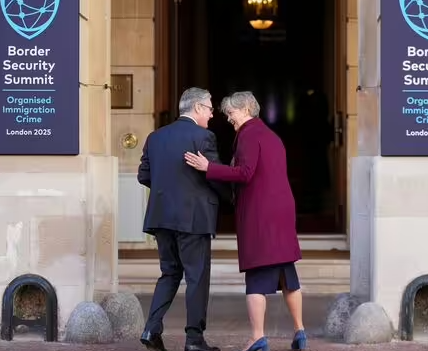Other projects being funded include ports and sea defences in the Caribbean and “climate investment” in India (a nation which has its own space programme).

Reform UK MP Lee Anderson (Image: Getty)
Lee Anderson has condemned what he called an “offensive” bonanza of overseas aid spending, with British taxpayers splashing out millions on projects from refugee schemes in Turkey to gender violence workshops in Ecuador. Posting on X, the Reform UK MP for Ashfield said: “Warning… Some taxpayers may find this offensive,” before reeling off figures culled from the Government’s own DevTracker portal.
Among the schemes listed by Mr Anderson was a hefty £127.6 million earmarked for “building refugee resilience and inclusion” in Turkey. The post detailed a series of budgeted amounts for international development projects tracked on the Foreign, Commonwealth & Development Office’s (FCDO) website. Mr Anderson, who clarified that they represent budgeted totals, not amounts already disbursed, added that most programmes were ongoing and that approvals occurred under both Conservative and Labour governments.
Other projects highlighted included £349.2 million for creating critical economic infrastructure such as bridges, renewable energy, ports and sea defences in the Caribbean; £558.6 million for increasing provision of and access to impartial news and information via the BBC World Service in English and local languages across the developing world; £212.8 million for support for health in Nigeria; and £42.7 million for a partnership for Agile Governance and Climate Engagement in the same country.
Further entries covered £34.9 million for strengthening Pakistan’s health system to recover from COVID-19 and build future resilience; £120.4 million for improving local government ability to deliver infrastructure services in Nepal; £95 million for strengthening societal and economic resilience in Jordan, including expanding contributory social insurance schemes and supporting tax-financed social-assistance schemes; £149.7 million for pioneering climate investment in India; £120 million for a Climate and Environment programme in Bangladesh; and £108 million for a Climate Investment Fund in Pakistan.
Still further allocations listed were £23.8 million for a Freedom and Resilience Programme in the Western Balkans to address structural issues including ethno-nationalist division, government transparency and accountability; £26.7 million for improving the effectiveness, accountability and transparency of economic policies in Kyrgyzstan, Tajikistan and Uzbekistan; £38.1 million for a climate smart jobs programme in Uganda; £5 million for a Rights, Inclusion, Voice and Agency programme to empower women, girls and excluded groups in Nepal; and £99 million for transforming education and £20.6 million for accelerating economic transformation in Ethiopia.

India actually has its own space programme (Image: IRSO)
Smaller-scale initiatives mentioned included £40.8 million for stabilising the deforestation frontier in Colombia; £3.2 million for reducing inequality and exclusion experienced by LGBTI people in the Caribbean; £9 million for supporting resilience, governance and economic reform in Moldova; £4.8 million for a Roads Development Programme in Liberia; and £2.6 million for deepening democracy in Mozambique.
Mr Anderson also pointed to £320,922 for arts-based approaches to tackling gender-based and racialised violence in Esmeraldas, Ecuador; £184,611 for documenting femicide through research, film and participatory ceramic art in Vietnam; £181,345 for developing an art-based public engagement and advocacy model for transforming social norms on gender-based violence in the Andean region; and £36,941 for supporting parliamentary reform, health for girls and environmental waste management in Mbabane, Eswatini.
Many replies to Mr Anderson’s post voiced frustration over the spending. One user described it as “a big scam that none of this money is going to anything it says and is lining the pockets of the corrupt.” A second commented: “This is absolutely mental. So much waste.”
The disclosures come amid recent changes to the UK’s aid budget. In February 2025, Prime Minister Keir Starmer announced a reduction in official development assistance (ODA) to 0.3% of gross national income from 2027, down from the 0.7% target set by law in 2015.
The figure nevertheless equates to the lowest level since 1999 and will free up funds for defence spending, aiming to reach 2.5% of GDP by 2027. The cut has drawn criticism from NGOs, who warn it will impact education and health in countries like those in Africa. Overall, £3 billion in cuts are planned over the next two years.
Despite the reductions, bilateral aid for 2025/26 is projected at £8.7 billion, according to FCDO figures. Mr Anderson’s post underlines the ongoing controversy over aid allocation, especially as domestic pressures mount from high national debt – at 96.3% of GDP – and strained public services.
Those, like Mr Anderson, who are uneasy at the level of spending argue it diverts resources from UK priorities, while supporters maintain it advances national interests in security and global stability.
As public discourse intensifies, Mr Anderson’s intervention highlights tensions between international commitments and domestic fiscal constraints. With winter approaching and energy costs rising, calls for a review of aid priorities are likely to grow.

